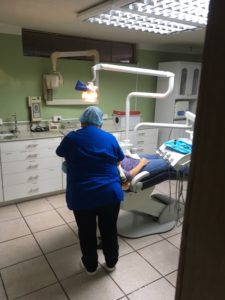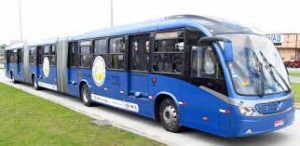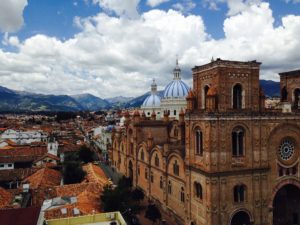 Before we came, we heard that Dr. Bolaños, in Ibarra, was good. He is one of the few in this part of the country who takes credit cards. We emailed him and made an appointment.
Before we came, we heard that Dr. Bolaños, in Ibarra, was good. He is one of the few in this part of the country who takes credit cards. We emailed him and made an appointment.
After a few days in Cotacachi, we began asking for referrals to dentists here. We chose to switch to Dra. Martha Guerra, before seeing Dr. Bolaños, and are satisfied with her expertise. She studied and practiced for 17 years in Europe (Spain and London) so she has all the latest techniques AND she speaks English fairly well. The one drawback is that she doesn’t take credit cards. Hers is a one-person office, where she does it all. A person preferring a more familiar style of professionalism might want to try a different office in a bigger city. Gary is having two crowns replaced. He was pleased with his first appointment, wherein she removed old crowns and installed temporaries. I have had two appointments to take out old metal fillings and replace them. I was happy that she used a dental dam when taking out the old mercury-filled fillings. Dr. Guerra was gentle, compassionate and soothing with me. We have had great conversations in half-English-half-Spanish, with plenty of laughter. Together, we spent an hour translating her intake form into English, for the benefit of future patients.
Quito
Quito, the capital city of Ecuador, has plenty of holistic dentists and doctors, as does the next largest city, Cuenca. A person wanting to visit a lower-cost dentist in Ecuador can do a search for “Dental Tourism”. We figured that the cost of our entire month in Ecuador – staying with a friend rather than in hotels – will cost us far less than seeing a U.S. dentist to have this work done.
Ibarra
In a city near us, Ibarra, there is an integrative medicine clinic called The Jade Center. They have a holistic “biological” woman dentist there who gets rave reviews. There seem to be more women dentists than men, from what we’ve observed. The Jade Center is the place to go for chiropractic-type adjustments, as well as yoga classes and courses in herbalism, and more.
Cotacachi
Happily, natural health care products are available here in Ecuador. Even in a town as small as Cotacachi, I found two natural products stores. One is called Prana Vital and sells primarily organic food and herbs and soaps and such. The other is called Natural Heath Store or Naturalezay Vida. It is like a natural supplements store in the US, but tiny.
Every Thursday, there are two outdoor organic markets that happen in little nooks off the sidewalk downtown. One is next to a gringa-owned bakery, where expats sell their organic produce, organic yogurt, organic bread, blueberries, crocheted items, organic meats, etc. The other is in an arcade-type space between buildings and sells similar items. It’s nice to see that over the years, the gringos who have been here a long while have been opening up businesses to serve the town and the expat community both. Some of the local Ecuadorians have also opened cafes that cater to expats/tourists. That type of place tends to become a hangout for English-speaking residents. The most popular here in town are called “Serendipity” and “Rock Solid Cafe”. A family from Texas – Mom and Dad, their adult sons and their wives, and a few babies – moved to Cotacachi recently and opened a sports bar. People can get familiar US food there, smoke cigarettes and watch sports on TV. It’s looking like “Travelers & Sportsmen’s Bar” will be successful. Although we are looking for places with health-oriented food & products, some people will be glad for a place to get hamburgers and smoke cigarettes with cheerful Texans.
For health buffs, Cotacachi even has a wonderful “Parque Activo”: a city park with an expansive view of the volcano, filled with exercise machines for adults. These machines are brightly colored, and are really like large-sized playground equipment! We had fun exercising on them.
For those who consider moving to South America but wonder if natural alternative health practitioners and products are available, the news is good in this region. It’s even more prevalent in the larger cities like Ibarra & Cuenca, and in focused areas such as the valley of Vilcabamba (where the hippies all gather and drive the locals nuts). For people like me, it’s great to be able to support my health with herbal products while doing my dental tourism!
 The major mode of transportation to get around Ecuador is buses. The majority of the people living here cannot afford to own cars, and there are many who simply choose not to own one because it’s not necessary. A bus ride from Cotacachi to Quito is currently about $2.50. One from Cotacachi to Otavalo is .35, and they run all of the time. The buses are all diesel so they are noisy and polluting but they are a necessity in Ecuador.
The major mode of transportation to get around Ecuador is buses. The majority of the people living here cannot afford to own cars, and there are many who simply choose not to own one because it’s not necessary. A bus ride from Cotacachi to Quito is currently about $2.50. One from Cotacachi to Otavalo is .35, and they run all of the time. The buses are all diesel so they are noisy and polluting but they are a necessity in Ecuador. 
